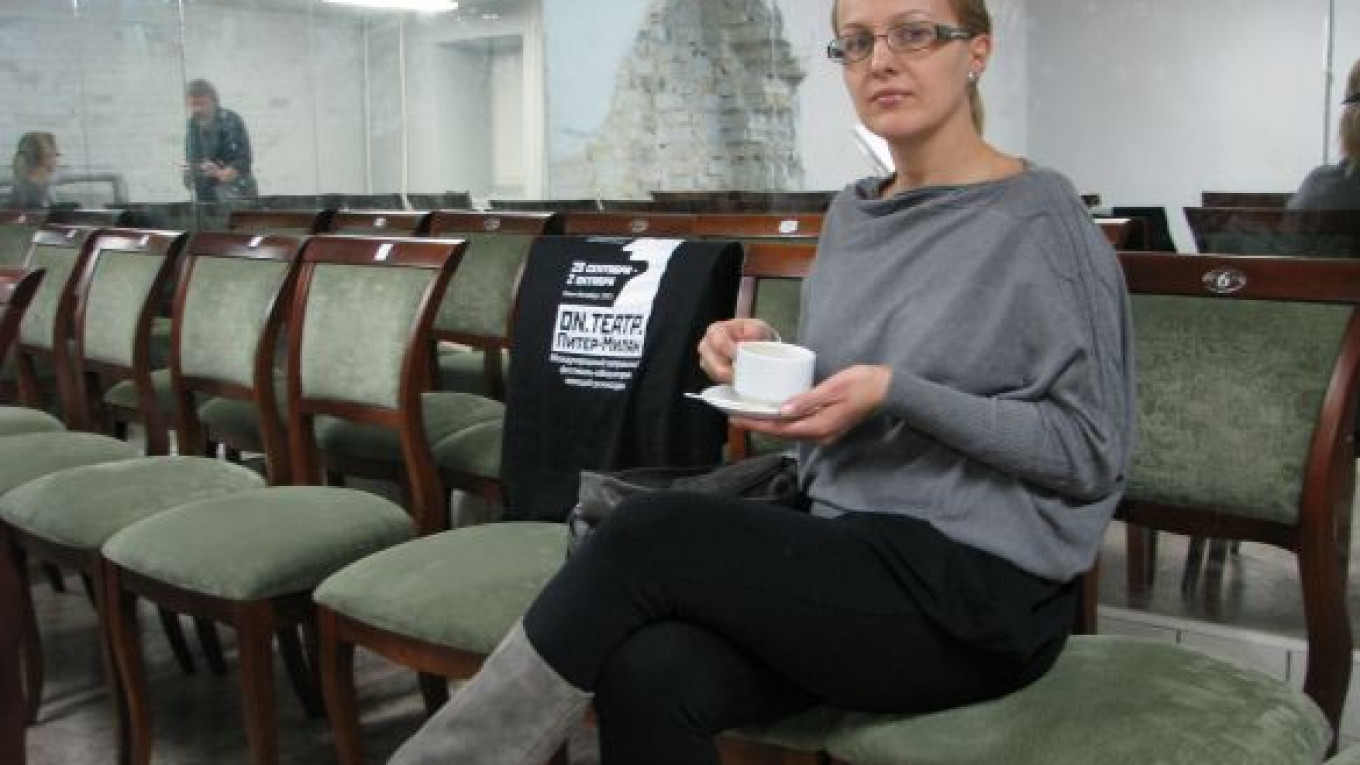Milena Avimskaya was born in Kazakhstan, grew up in the Siberian city of Surgut and was educated in Moscow. She found her calling in St. Petersburg.
A graduate of the department of theater management at the Russian Academy of Theater Arts in Moscow, she is the founder and managing director of St. Petersburg's ON.TEATR, a spirited new venue in a city famed for its classical and conservative approach to the arts.
"There really isn't a new play movement here," she says about St. Petersburg, "But since I'm sick in the head, I said, 'We have to do this!'" And do it she has.
As Avimskaya describes it, she "followed" her husband, the director Garold Strelkov, to St. Petersburg, when he accepted a job at the Lensoviet Theater. "I arrived here pregnant, and I knew no one," she told me matter-of-factly as we sat in a bright white rehearsal space in her new professional home. "So I started attending the theater and meeting young people."
Avimskaya was interested in problems of theater development long before she began imagining ON.TEATR, whose name is officially written in all capital letters at her insistence. While compiling a dissertation titled "Finding Work for Theater Workers in Times of Transition," she conducted a poll to learn how often graduates of Moscow's theater institutes were aided by their institutions during job searches.
"The vast majority said 'nothing, no meetings, no help, no advice,'" Avimskaya states almost indignantly.
Upon arriving in St. Petersburg she conducted more research and learned that just 5 percent of local academy graduates actually found jobs in theaters. When she shared this information with an official at the institute, he asked her not to publicize it.
She honored that request but eventually did something far more important. In 2009, she organized a festival bringing together young directors and actors to create barebones shows in a brief period. "In fact," Avimskaya declares, "many good shows came from that. The organization I created worked."
She repeated the festival the following year with grand ambitions, presenting 35 different shows staged by 35 directors. Andrei Moguchy, one of St. Petersburg's top experimental directors, warned Avimskaya in advance that nothing would come of her efforts. But after he saw several of the showings he decided to open his own laboratory for young directors.
Thus, ON.TEATR began taking shape as Avimskaya held out a helping hand to talented young people, and they began gathering around her. Since 2009 ON.TEATR has mounted 16 productions, has conducted a joint laboratory with partners in Italy and, in August this year, assumed residence in a large basement measuring 500 square meters in a centrally located courtyard at 18 Ulitsa Zhukovskogo, not far from Liteiny Prospekt.
Presently, the ON.TEATR marquee features numerous productions of plays by top contemporary Russian writers – Yury Klavdiyev, Oleg Bogayev, Vasily Sigarev, Yelena Isayeva, Yaroslava Pulinovich and Anna Yablonskaya, who perished in the terrorist attack at Domodedovo airport last January.
Equally impressive is the large number of directors who have gravitated to the new venue. Avimskaya invariably refers to them as "our" or "my" directors, exhibiting a motherly affection for them all. But more than showering love on them, she looks for ways to empower them.
"I was criticized by one critic for not appointing an artistic director," she explains. "But I say that all my directors are talented and I don't want any of them to have someone else wielding power over them."
The result is a system by which each director works with his or her own group of actors, technicians and designers, and answers for everything the group does. The group shares the proceeds of each performance 50-50 with the theater, and things are going well enough that some actors are taking home 1,000 rubles ($32) for a single night's work. Thanks to their work at ON.TEATR, such directors as Dmitry Volkostrelov, Denis Shibayev, Maria Kritskaya, Yekaterina Maximova and others have begun making names for themselves. This focus on directors sets ON.TEATR apart from other similar endeavors in Russia, and means that its work has its own unique stamp.
Avimskaya, however, frowns and waves off attempts to call ON.TEATR a success. It's early for that, she implies. But she does take satisfaction in tossing out some numbers, as one might expect of a professional manager.
"Between 2005 and 2008 only four young directors staged shows in St. Petersburg," Avimskaya declares. "In 2009 alone, after our first festival, the number jumped to six."
That number, according to Avimskaya, is now up to about 10. I have always been a bad mathematician, but I suspect that adds up to success.
For more information go to .
A Message from The Moscow Times:
Dear readers,
We are facing unprecedented challenges. Russia's Prosecutor General's Office has designated The Moscow Times as an "undesirable" organization, criminalizing our work and putting our staff at risk of prosecution. This follows our earlier unjust labeling as a "foreign agent."
These actions are direct attempts to silence independent journalism in Russia. The authorities claim our work "discredits the decisions of the Russian leadership." We see things differently: we strive to provide accurate, unbiased reporting on Russia.
We, the journalists of The Moscow Times, refuse to be silenced. But to continue our work, we need your help.
Your support, no matter how small, makes a world of difference. If you can, please support us monthly starting from just $2. It's quick to set up, and every contribution makes a significant impact.
By supporting The Moscow Times, you're defending open, independent journalism in the face of repression. Thank you for standing with us.
Remind me later.







